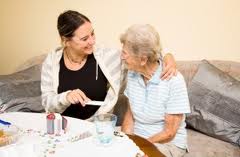
According to the American Lung Association, next to influenza, pneumonia is ranked as the eighth leading cause of death in the United States. Typically, pneumonia exists when a patient’s immune system is weakened due to another illness, such as bronchitis or the flu. Many people develop it in the hospital. During the illness, seniors will need support from a caregiver.
If a loved one has the flu, watch for these warning signs which could develop into pneumonia:
- Seek immediate medical attention is a loved one has difficulty breathing or shortness of breath, pain or pressure in the abdomen or chest, confusion, abrupt dizziness and/or continual vomiting.
- Dehydration and a worsening of any other medical conditions, such as heart problems, emphysema or asthma, are also cause for alarm.
Luckily, there are a few things you can do to treat a loved one at home to promote recovery. Here are some tips for taking care of a loved one with pneumonia at home:
-
Give your loved one plenty of fluids and make sure he or she rests, saving strength for recovery. Fluids help loosen secretions so that the patient can bring up phlegm.
-
Try to get your loved one to eat something that will build up his or her strength, such as lentil or chicken soup.
-
Don’t let your loved one do any chores until he or she is stronger.
-
Give your loved one aspirin or acetaminophen to control any fever.
-
Wash your hands before preparing your loved one’s food or touching him or her.
-
Make sure no visitors have colds or coughs.
-
Try propping your parent up in bed to see if that helps his or her breathing.
Nearly 1 in 5 people with pneumonia make costly, stressful return trips to the hospital within the first 30 days of being diagnosed with the condition. Individuals with pneumonia also are at a higher risk of having additional, underlying conditions that can make it more difficult to get better without assistance. Research shows that many of these rehospitalizations are potentially preventable through the use of proactive, team-based care-coordination programs.
by Erin Schmidt
